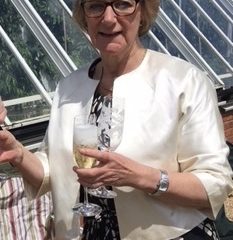There’s a lady who lived just down the road from us in Cambridge of whom everyone should know the name. Julian of Norwich, a fifteenth-century East Anglian anchoress, was – and remains – an influential Christian mystic and theologian. In addition to her spiritual importance, she is the first woman ever known to write in the English language. To me it is staggering that this milestone in the literary canon is not more widely known, especially because on a personal level studying Julian was the catalyst to my academic career.

I first was introduced to Julian’s writings in the third year of my undergraduate degree at the University of Edinburgh, which I in fact spent on exchange at McGill University, Montréal. So taken was I by the intricacies of her text that she became the topic of my first conference paper, presented at the University of Victoria on Vancouver Island, and, subsequently, the central figure of my MPhil thesis, the work which first brought me to Cambridge. During the first year of my PhD, I attended a class about her whilst a visiting doctoral student at Harvard University. Now, I have the pleasure of teaching her work to my own undergraduates.
I am exceptionally fortunate to be able to say that I have always been encouraged – and able – to pursue my education, an unerring source of joy in my life, to the fullest extent. It continues daily to broaden, refine and challenge my horizons and allows me to be part of an ever-expanding community of curious and kind thinkers. Most recently, this network has grown to include the undergraduate students I now teach for the university.
Teaching has quickly become the most satisfying part of my PhD. It feels very natural to me to share my passion for my subject, but it has also proved to be a source of substantial anxiety: ‘Am I doing a good enough job?’ ‘Do I look “old enough” to teach?’ ‘Do I sound authoritative enough in the classroom?’ ‘Would my students prefer a more qualified supervisor?’ Gender undoubtedly contributes to these concerns.
Preparing to teach a supervision recently, I re-discovered a passage from Julian that spoke directly to my worries. Despite her revered position in literature, theology and history today, in her own space and time Julian was acutely conscious of the fact that she is bound by socio-cultural convention, in fact by ecclesiastical law, from serving as a teacher to her reader. She explains that she is limited, ‘For I am a woman, lewed, febille, and freylle’. This admission occurs close to the beginning of her writings, in which she wonderfully and wisely documents a divine visionary experience she had whilst deathly ill in 1373 and on which she continued to ruminate over the course of her subsequent life of enclosure in a Norwich anchor cell.
The anchoress’ commitment to understand the true meaning of her visions is matched in her sense of responsibility to accurately and widely share her revelations with ‘alle myne evyn-Cristende’ [all of my fellow Christians].
To do so, she must negotiate the limitations she experiences due to her gender with her pious desire to spread the insights she is granted by God. She boldly challenges her reader: ‘Botte for I am a woman shulde I therefore leve that I shulde nought telle yowe the goodenes of God, sine that I sawe in that same time that it is his wille that it be knawne?’. Carefully and confidently side-stepping Church doctrine by suggesting a distinction between teaching and sharing, Julian establishes the importance of her own voice. Her words continue to echo strongly almost 650 years later.
It is upon the shoulders of giants like Julian that generations of female educators stand. Her advice to those feeling imposter syndrome in the classroom? ‘Than is this the remedye, to knaw […] and refuse the fals’.


